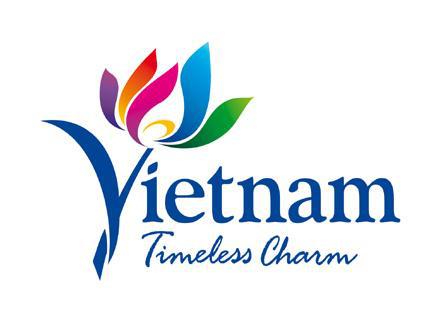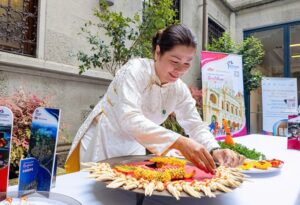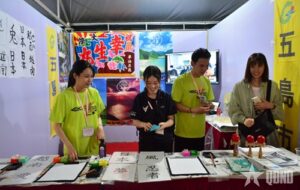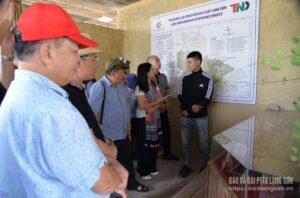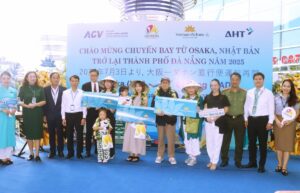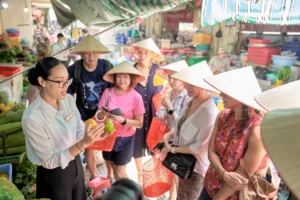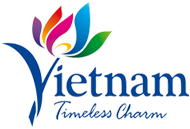For the first time, the royal tea party space of the Nguyen Dynasty has been recreated in the heart of Hue Imperial Citadel, introducing a poetic and promising new night-time tourism experience.
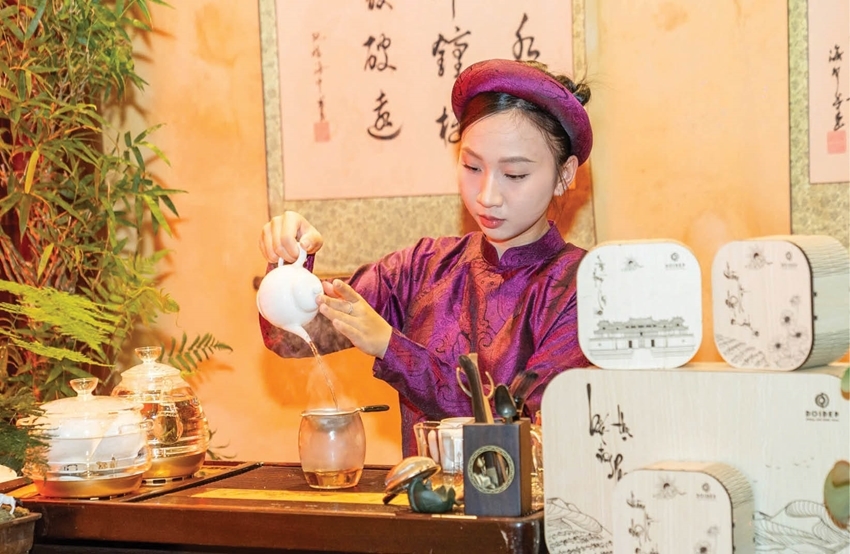
A “tra nuong” (tea server) brewing tea at the Royal Tea Party
The “Royal Tea Party” service not only promotes Vietnamese tea culture but also brings a fresh breeze to the nighttime experience, which has long been limited in the former imperial capital.
Vividly reenacted
Amid the gentle glow of lanterns and the fragrant aroma of tea in Thieu Phuong Garden, a regal space once reserved for the leisure of Nguyen Dynasty emperors, Hue Monuments Conservation Center in collaboration with the Doi Dep tea brand organized a program titled “Reenactment of the Emperor’s Tea Banquet for His Courtiers”.
The program takes place at Di Nhien Pavilion, an ancient architectural structure located within Thieu Phuong Garden complex, one of the most renowned gardens of the former Imperial Capital. In 1844, Emperor Thieu Tri ranked it as the second most beautiful scenic spot of the Ancient Capital. Here, participants not only drink tea but also “drink” the atmosphere, the history, and the culture.
Royal Tea Party is reenacted as a vivid courtly ritual, including the Emperor inviting his high-ranking mandarins to drink tea, recite poems, and compose classical That Ngon Bat Cu poems (seven-word eight-line poems) right at the banquet. The solemn atmosphere is enriched by imperial court music with ancient songs, such as Phu Luc Dich and Trinh Tuong Tap Khanh, alongside the song of Hue-Singing “Ngu Huong Tra Ngat Hoang Cung”. More than just a Tea Party event, the setting resembles a miniature museum, showcasing artifacts such as glass paintings, Meditation poetry calligraphy, and bone-inlaid poems composed by the Nguyen Emperors.
Mr. Nguyen Phuoc Hai Trung, Deputy Director of Hue Monuments Conservation Center shared: “We aim to create a distinctive cultural tourism product. It will not only be an activity about tea but also serve as a place for experiencing the space, the art, and the imperial spirit of the past. This is a highly interactive service that both evokes historical memories and opens up new potential for developing night-time tourism products in Hue”.
Accompanying the program is tea artisan Pham Cong Tuan Ha, founder of the Doi Dep (thongs) tea brand, a co-organizer of the event. According to Tuan Ha, the reenactment of the Royal Tea Ceremony serves as a way to bring the public closer to the essence of Vietnamese tea culture, a tradition that is refined, diverse, and deeply rooted in life philosophy.
Mr. Ha explained that Vietnamese tea is not merely a beverage, but also a cultural symbol that connects with the spiritual consciousness of the nation. From this perspective, he introduced the concept of “Ngu Thuc Viet Tra”, five styles of tea appreciation, symbolizing 5 core values, which are truth, kindness, beauty, wisdom, and essence. Each tea style embodies a distinct layer of meaning, from the simplicity and rustic charm of Moc Thuc (Rustic Style), the refinement of Van Thuc (Aesthetic Style), the solemnity of Ngu Thuc (Imperial Style), the depth of Tinh Thuc (Meditative Style), to the enlightening knowledge of Thu Thuc (Scholarly Style). Notably, Ngu Thuc, the imperial tea style, is the soul of this service. “That cup of tea is not only about peace but also carries the eternal Vietnamese dream of peace and harmony,” Mr. Ha shared emotionally.
He also stated that Vietnam is one of the few countries with a long-standing, popular tea culture, which is distinct from other countries where tea is associated with the aristocracy or religion. The diversity and depth of Vietnamese tea culture are unique characteristics that tourism can leverage and promote to the world.
Ready to welcome tourists
“Royal Tea Party” is considered an important pilot initiative in the journey to diversify Hue’s night-time services, which has long been a weakness in the strategy to encourage tourists to extend their stay in the Ancient Capital.
Although still in the pilot stage, the program has left a strong impression on visitors by bringing them into a historical space imbued with poetry and art. After joining a tea party, Ms. Nguyen Lan Phuong, a tourist from Ho Chi Minh City shared: “From the architectural setting and the music to the ceremonial way the tea was served, I was deeply moved at everything . This was not merely about drinking tea, but a refined and profound cultural experience”.
According to Mr. Hai Trung, Hue currently lacks culturally rich night-time products that can create a distinctive “spirit” for the city. Therefore, utilizing an authentic historical space like Thieu Phuong Garden, where Emperor Thieu Tri and Tu Duc once invited courtiers for conversations and tea, is seen as a solution to illuminate Hue’s nightlife. “We plan to develop the royal tea experience into two formats: day-time and night-time; in which, night-time experience will incorporate artistic performances and create a vivid historical atmosphere, allowing visitors to truly interact and absorb the reach a deep understanding about Hue’s culture,” Mr. Trung stated.
The official service is set to launch at the end of June. At the same time, an afternoon tea party service at Ngoc Dich Lake, an ancient landscape within the Hue Imperial Citadel, is also being prepared for debut in August. With the dedicated involvement of passionate artisans, Hue is demonstrating a direction that is both creative and sustainable: not only preserving but also reviving cultural values that once seemed to have faded into the past.
“Royal Tea” is not just a cup of tea, it is a meeting between the present and the past, between the art of living and the culture of the royal court. More importantly, “it is a way that Hue uses to tell its story to the world, through the taste of tea, music, and the light in the stillness of the Ancient Capital’s nightlife,” expressed tea artisan Pham Cong Tuan Ha.
Source: Hue News – news.huengaynay.vn- Jun 19, 2025
